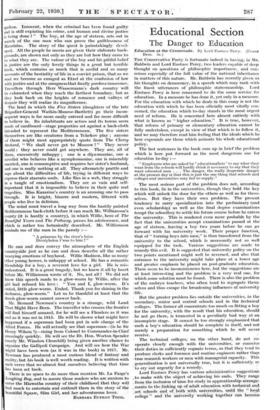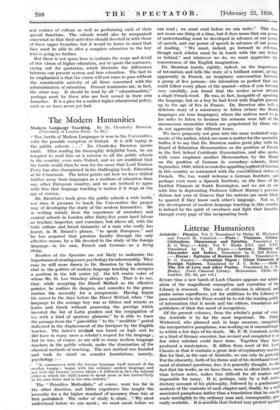Educational Section
The Danger to Education
THE Conservative Party is fortunate indeed in having, in Mr. Baldwin and Lord Eustace Percy, two leaders capable of deep thought on questions of philosophic importance, and con- scious especially of the full value of the national inheritance in matters of this nature. Mr. Baldwin has recently given us -his thoughts on democracy, in a speech which may rank with 'the finest utterances of philosophic statesmanship. Lord :Eustace Percy is here concerned to do the same service for .education. In a measure he has done it, yet only in a measure. For the education with which .he deals in this essay is not the education with which he has been officially most vitally con- cerned, the education which to-day stands in the most urgent need of reform. He is concerned here almost entirely with what is known as " higher education." It is true, however, 'that reform of primary or elementary education cannot be fully undertaken, except in view of that which is to follow it, and we may therefore read him feeling that the ideals which he here expounds are those which animate his whole educational policy.
The last sentences in the book sum up in brief the problem which is here put forward as the most dangerous one for education to-day
" Employers who are asked by educationalists ' to say what they want from the schools will hardly think it necessary to say that they want educated men . . . The danger, the really desperate danger at the present day is that this is just the one thing that schools and colleges and universities may fail to supply."
The most serious part of the problem does not, according to this book, lie in the universities, though they hold the key .which will unlock the door for the others as well as for them- 'selves. But they have their own problem. The present 'tendency to carry specialization into the preliminary (and even scholarship) as well as the final degree examinations tempt the schoolboy to settle his future course before he enters the university. This is rendered even more probable by the fact that the universities accept examinations passed at the age of sixteen, leaving a boy two years before he can go forward with his university work. Their proper function, that of " turning boys into men," is thus transferred from the ..university to the school, which is necessarily not so well equipped for the task. Various suggestions are made to remedy this evil. It is suggested that university policy on the two points mentioned might well be reversed, and also that . entrance to the university might take place at a lower age and greater emphasis be placed on post-graduate education. There seem to be inconsistencies here, but the suggestions are at least interesting and the problem is a very real one, for which some solution must be found. There is also the problem - of the embryo teachers, who often tend to segregate them- :selves and thus escape the broadening influences of university life.
But the greater problem lies outside the universities, in the secondary, senior and central schools and in the technical colleges. The former all concentrate too much on fitting a boy for the university, with the result that his education, should . he not go there, is truncated in a peculiarly bad way at an :incomplete stage. It cannot be too strongly emphasized that such a boy's education should be complete in itself, and not merely a preparation for something which he will never receive.
• ' The technical colleges, on the other hand, do not co- . operate closely enough with the universities, or conceive their duties in sufficiently cognate terms, so that they tend to produce clerks and foremen and routine engineers rather Mall true research workers or men with managerial capacity. This generalization is not universally true, but it is sufficiently so ' to cry out urgently for a remedy.
Lord Eustace Perey has various administrative suggestimis rte make with the object of achieving his ends. They range . from the inclusion of time for study in apprenticeship arrange- - ments to the-linking up of adult education with technical and art schools and of both with universities, until the
college " and the university working together can become
real centres of culture as well as performing each of their special "functions. The schools would also be reorganized somewhat so that their activities should dovetail in-with those of these upper branches, bqt it would be borne in mind that they must be able to offer a complete education to the boy
who is going no further. . .
But there is not space here to indicate the scope and detail of this vision of higher :education, nor to quote the sentences, crying out for quotation, which illustrate the differences between our present system and true education. The fact to be emphasized is that the vision will not come to pass without the considerable activity of all those concerned with the administration of education. Present tendencies are, in fact, the other way. It should be read by all " educationalists," perhaps most by those who are best versed in their own branches. It is a plea for a unified higher educational policy, such as we have never yet had.











































 Previous page
Previous page